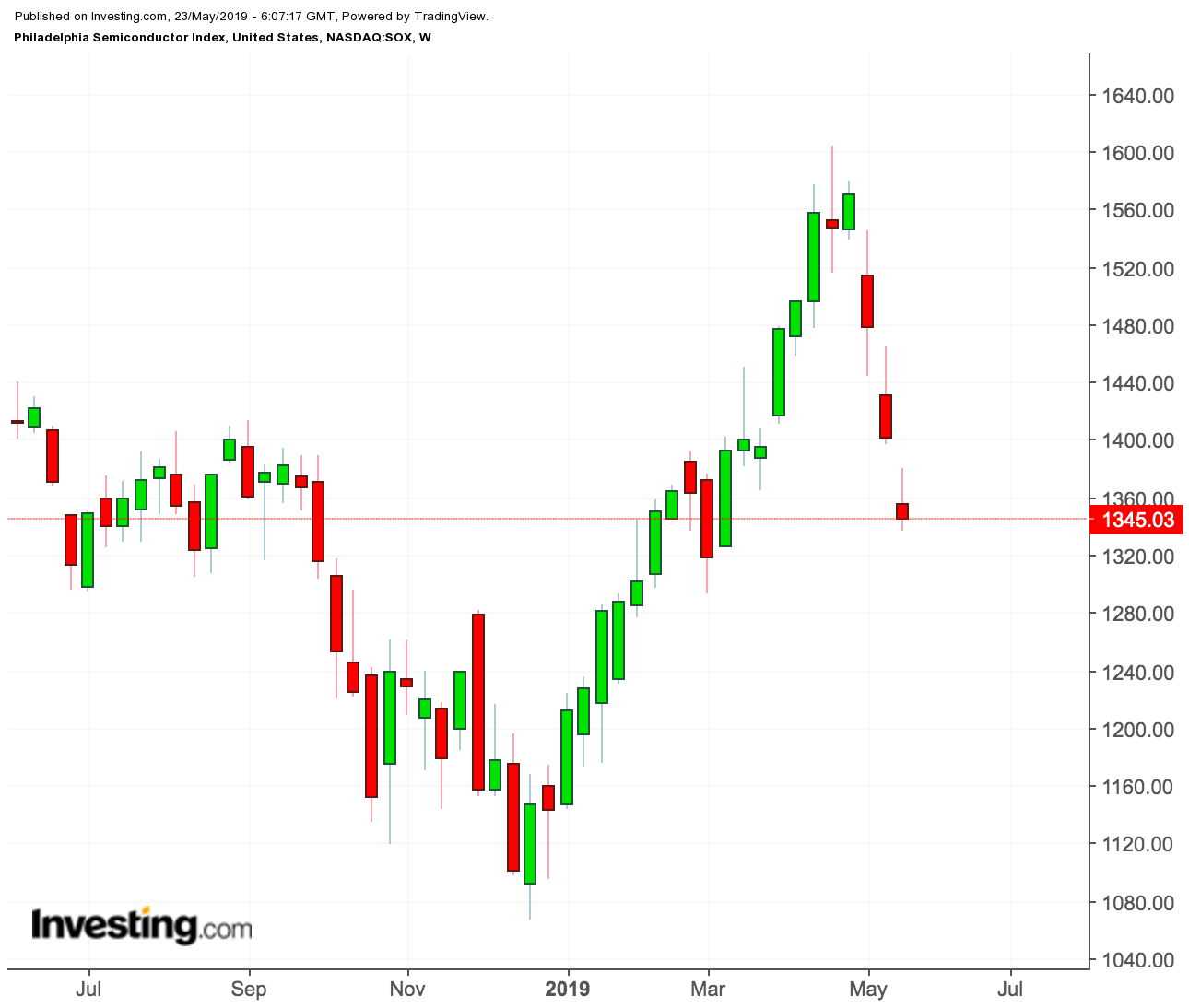With Q1 reporting season almost over, it’s becoming quite clear that the earnings momentum in the market’s two big pillars—technology and retail—is slowing. If this trend persists, it won’t be hard to predict that investors have seen the best of the decade-long expansion in stock markets.
Some of the U.S. largest technology companies, including Apple Inc. (NASDAQ:AAPL), Alphabet (NASDAQ:GOOGL), and Intel Corp (NASDAQ:INTC), have been hurt by weakening demand for their products and services, and cracks have begun to appear in their future expectations.
Google’s parent Alphabet posted its slowest revenue growth since 2015, while Apple reported its first back-to-back drop in quarterly sales and profit in more than two years. And for the world’s largest internet retailer, Amazon (NASDAQ:AMZN), the first-quarter was a mixed bag. While operating income jumped 129% to a record, its revenue growth slowed to 17%, well below the 30% quarterly pace Amazon has averaged over the past three years. The company projected 16% growth for the second quarter based on the midpoint of its forecast.
And the broader picture also doesn’t look promising. For 15 straight quarters through last June, profits from technology companies outpaced the S&P 500, with the growth gap averaging 6.3 percentage points. But that edge is quickly waning. Profits for the first quarter fell more than 6%, the worst in a decade, according to Bloomberg data.
Both large companies and consumers have contributed to this slowdown. Apple, for example, is being hurt by consumers’ reluctance to buy its more expensive models, while chipmakers are experiencing weak demand from a range of end markets including data centers.
Demand recovery hopes for the semiconductor industry faded away quickly after the escalation in the U.S.-China trade war, raising doubts about these companies’ ability to maintain substantial growth and profit margins if both global powers failed to find a quick resolution of their dispute.
The (Philadelphia Semiconductor Index) (SOX), is down 14% in the past month, becoming the biggest casualty of the trade war. Apple stock is down about 11% for the month on concerns that the iPhone maker could see further demand erosion if Chinese consumers and the government retaliate. China is Apple’s third largest market, bringing in nearly $52 billion in sales in the company’s most recent fiscal year.

Retailers Come Under Pressure
Retail is another area of the market where companies have started to feel the pinch. Kohl's Corp (NYSE:KSS) ), JC Penney (NYSE:JCP), and Nordstrom Inc. (NYSE:JWN) all reported declines in their first-quarter sales this week, while Home Depot (NYSE:HD) posted a weaker-than-expected rise in comparable-store sales.
What’s making the outlook particularly grim for these companies is the impact of higher tariffs on their imports from China. Earlier this month, the Trump administration imposed a 25% tariff on $200 billion in Chinese goods, up from a 10% duty that was put in place in October.
Kohl's, which imports about a fifth of its goods from China, said that additional costs related to rising import tariffs prompted it to lower its guidance for the year. The home-improvement chain Home Depot estimated it will spend about $1 billion more to buy goods with the 25% tariffs in place.
But the good news is that so far these retailers haven’t seen the weakness in consumer demand and they might come back strong in the remaining part of the year if the U.S.-China trade war doesn’t slow down the world’s largest economy. Kohl's and Home Depot blamed cool spring weather, competitive pricing, and promotions by competitors for their sales’ growth missing expectations.
Despite these disappointments, however, it wasn't all bad news for the retail sector. This week’s disappointing earning reports were in contrast with an earlier report from the big-box retailer, Walmart Inc. (NYSE:NYSE:WMT). The company posted its strongest Q1 comparable sales growth in nine years, helped by an increase in traffic as well as shoppers spending more per transaction. Online sales surged 37% from a year ago.
Bottom Line
Lingering trade tension with China is emerging as the biggest threat to some of the leading U.S.-listed companies. The dispute is making both companies and consumers hesitant when it comes to future spending. Investors should remain cautious while making investment decisions in stocks that are closely tied with the economy as long as the markets remain in the midst of this uncertain trading environment.
